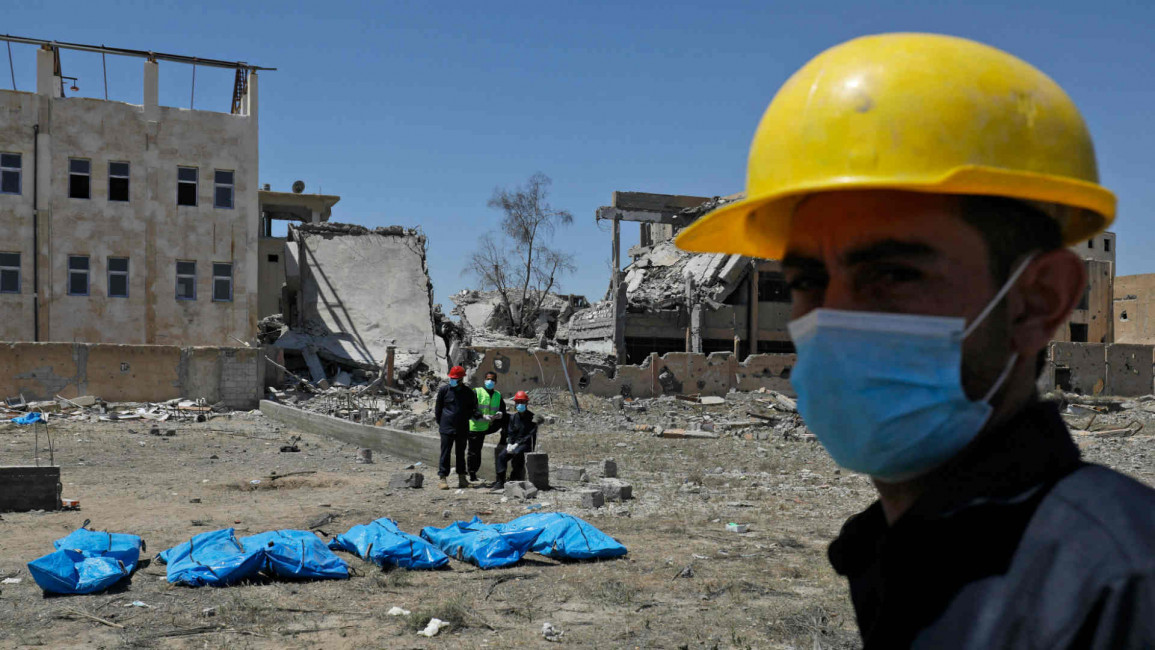Syrian groups uncovering IS mass graves need help, warns rights group
Syrians working to uncover mass graves in an area once ruled by the Islamic State group need help to preserve evidence, identify human remains and shed more light on the horrors perpetrated by the militants, an international watchdog said on Tuesday.
Human Rights Watch said thousands of bodies — of civilians slain by the extremists, residents killed in airstrikes by the US-led coalition and of IS fighters — remain to be recovered in several mass graves in and around the city of Raqqa. The appeal came in a new report released on Tuesday by the New York-based group.
Local members of the Raqqa Civil Council, a governing body set up by US-backed and Kurdish-led forces, are "struggling to cope with the logistical challenges of collecting and organising information" on the bodies uncovered and providing it to families searching for missing or dead relatives, HRW said.
Read more: The rapid 'liberation' of Raqqa was flawed from the outset
Raqqa was the extremists' de facto capital and the seat of their self-proclaimed caliphate, which at the height of their power in 2014 stretched across a third of both Syria and Iraq. Since then an array of Syrian and Iraqi forces have driven IS from virtually all the territory it once held, but the group is still present in remote areas along the border.
The extremist group, which attracted fighters from around the world, carried out mass killings and other atrocities, including public beheadings. Women and men accused of adultery were stoned to death, while men believed to be gay were thrown from the tops of buildings and then pelted with stones.
Human Rights Watch said identifying missing people and preserving evidence for possible prosecutions is critical for Syria's future.
Twitter Post
|
"Raqqa city has at least nine mass graves, each one estimated to have dozens, if not hundreds, of bodies, making exhumations a monumental task," said Priyanka Motaparthy, acting emergencies director at HRW.
"Without the right technical assistance, these exhumations may not provide families with the answers they have been waiting for and could damage or destroy evidence crucial to future justice efforts," she added.
HRW quoted Yasser al-Khamis, head of first responders in Raqqa, as saying that land mines further complicate exhumations.
Recovery and analysis of remains from mass graves is a complex process that requires a high level of expertise. Exhumations carried out without forensic experts can destroy critical evidence and complicate the identification of bodies, the report said.
The team in Raqqa, for instance, didn't take photographs of bodies in accordance with international forensic standards, which is important in documentation, HRW said.
Ibrahim al-Hassan, the head of the US-backed Raqqa Reconstruction Committee, said the enormity of the task only became clear after the team of first responders began its work.
"We didn't expect to have that many graves, and there could be even more," he said by telephone from Raqqa.
The first responders prioritise emergency and rescue work but have expanded their ranks in order to deploy forensics teams to excavate mass graves. Al-Hassan said his committee has asked the US to provide labs and DNA testing facilities but has yet to receive them.
"Our work currently is primitive," he said.
Hammoud Shawakh, who coordinates between the US and the Raqqa Reconstruction Committee, said the US-led coalition has provided $500,000 to the first responders so far this year. But he said DNA testing facilities are not widely available on the local market and would need to be provided by the US.
HRW's report said the first responders uncovered a mass grave at the city's al-Rashid playing field last month containing 553 bodies, and had begun work on a second one.
A video released last month by the Raqqa Civil Council showed members of the team removing the bodies of men, women and children, and placing them in blue bags.
"Families of those killed by ISIS deserve to know the fate of their loved ones and to have access to justice for those crimes," Motaparthy said, using another acronym for IS. "Preserving evidence from these mass graves is a key part of that."



